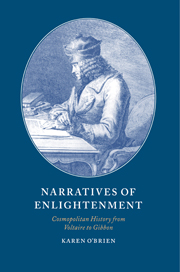Book contents
- Frontmatter
- Contents
- Acknowledgements and author's
- 1 Introduction: cosmopolitanism, narrative, history
- 2 Voltaire's neoclassical poetics of history
- 3 European contexts in Hume's History of England
- 4 William Robertson to the rescue of Scottish history
- 5 Robertson on the triumph of Europe and its empires
- 6 Emulation and revival: Gibbon's Decline and Fall of the Roman Empire
- 7 David Ramsay's sceptical history of the American Revolution
- Afterword
- Bibliography
- Index
- CAMBRIDGE STUDIES IN EIGHTEENTH-CENTURY ENGLISH LITERATURE AND THOUGHT
2 - Voltaire's neoclassical poetics of history
Published online by Cambridge University Press: 28 October 2009
- Frontmatter
- Contents
- Acknowledgements and author's
- 1 Introduction: cosmopolitanism, narrative, history
- 2 Voltaire's neoclassical poetics of history
- 3 European contexts in Hume's History of England
- 4 William Robertson to the rescue of Scottish history
- 5 Robertson on the triumph of Europe and its empires
- 6 Emulation and revival: Gibbon's Decline and Fall of the Roman Empire
- 7 David Ramsay's sceptical history of the American Revolution
- Afterword
- Bibliography
- Index
- CAMBRIDGE STUDIES IN EIGHTEENTH-CENTURY ENGLISH LITERATURE AND THOUGHT
Summary
Before his apotheosis as the personification of the Enlightenment, Voltaire was known to French, British and American readers, perhaps primarily, as a historian of France and the world. Before he became demonised, in nineteenth-century eyes, as the prophet of atheism, Voltaire's histories were perused by appreciative and unperturbed readers throughout the continent and its colonies. Voltaire's histories have not recovered today from the low reputation to which they sank after the French Revolution, and the last book-length study of these works is now nearly forty years old. Without wishing to make excessive claims for their merit and influence, this chapter will attempt to assess the distinctive and original contribution made by Voltaire's histories to cosmopolitan history in the eighteenth century. Most of these works belong roughly to the middle period of his career during which time he enjoyed a measure of official sanction and approval from Louis XV, who appointed him historiographer royal in 1745, and from Frederick II of Prussia. Voltaire's major histories include L'Histoire de Charles XII (1731), Le Siècle de Louis XIV (1751 and after) and the Essai sur les mcsurs (1754 and after), all of them many times reissued, revised and translated during his lifetime. Together, these works represent a sustained and wideranging exploration of the literary, cognitive and thematic potential of historical narrative. As literary works, they make new commitments to form and style which exceed and displace older rhetorical theories of purpose and expression.
- Type
- Chapter
- Information
- Narratives of EnlightenmentCosmopolitan History from Voltaire to Gibbon, pp. 21 - 55Publisher: Cambridge University PressPrint publication year: 1997
- 2
- Cited by



